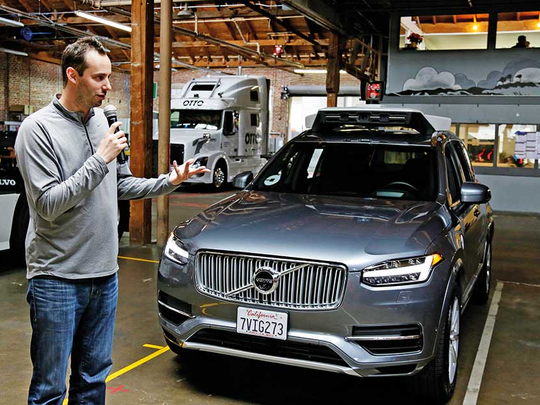
San Francisco: Anthony Levandowski, the Uber executive accused of stealing trade secrets from Google, is stepping aside from leading some of the company’s work on self-driving vehicles, amid a bare-knuckled legal fight between the two technology giants.
Levandowski, one of the self-driving-car industry’s more experienced engineers, has recused himself from working on Uber’s lidar technology — short for light detection and ranging, a key hardware component in the operation of any autonomous vehicle. Levandowski disclosed the change on Thursday in an internal memo that was obtained by Business Insider, adding that he will no longer attend meetings or make decisions about lidar efforts while legal proceedings continue.
“We should all be proud that our self-driving technology has been built independently, from the ground up,” Levandowski said in his email, which was addressed to his Uber employees. “With this move, I hope to keep the team focused on achieving the vision that brought us all here.”
Uber confirmed the email and declined to comment further.
Intellectual property
The move punctuates an increasingly nasty legal battle between Uber and Waymo, the self-driving-vehicle company that was spun off from Google’s parent company. In February, Waymo sued Uber, alleging that the ride-hailing company was using intellectual property, including downloaded documents, stolen by Levandowski when he was an executive at Google.
Waymo is asking a federal court to issue an injunction that would halt Uber’s work on self-driving cars, which the judge in the case is expected to decide on next week. If the decision goes in Waymo’s favour, it could seriously impede Uber’s progress in autonomous vehicle research.
Levandowski’s shift in role appears designed to shield Uber from any perception of impropriety during the litigation. But legal scholars question whether the change will be effective.
“Assuming a successful suit, Waymo could get damages for the period AL was involved,” Michael Carrier, a professor at Rutgers Law School, said in an email, referring to Levandowski. “If the purloined documents are still accessible to, and can be implemented by, the rest of the team, his recusal makes no difference.”
With the change in role, Eric Meyhofer, a principal at Uber’s Advanced Technologies Group in Pittsburgh, will lead the driverless car division and report directly to Uber’s chief executive, Travis Kalanick. Levandowski, who had reported to Kalanick, will report to Meyhofer. Levandowski remains in charge of handling testing and operations of Uber’s self-driving vehicle group in cities.
Proprietary research information
At the heart of Waymo’s case is the technology involved in Uber’s lidar. Levandowski, a pioneer in the field of self-driving research, worked for Google’s autonomous vehicle wing for nearly a decade, but left to form his own start-up, Otto, at the beginning of 2016. He sold that start-up to Uber in August for $680 million.
Waymo alleged that before Levandowski left Google, he copied and took with him terabytes’ worth of proprietary research information on Google’s lidar hardware. Levandowski has denied the assertions, and Uber has similarly denied that it is using driverless car technology stolen from Google.
At stake is what many technologists consider to be the intersection of the next wave of computing, artificial intelligence and an entirely new category of transportation. Kalanick has said the race for self-driving technology is “existential” to Uber’s future, looking ahead to a day when smart driverless vehicles can move millions of people around as quickly and efficiently as possible.
That race has been heating up. Waymo said this week it plans to test driverless vehicles with the public in Arizona, part of a partnership with Fiat Chrysler. General Motors purchased Cruise Automation, an autonomous-vehicle technology start-up, in 2016 for $1 billion in cash and stock, and is working with the Uber rival Lyft on its ambitions for an autonomous-vehicle network.
Other players include Tesla, which offers a version of self-driving technology. Apple, too, is working on a project on self-driving cars, which has changed in tenor and scope as the company has run into some hurdles internally during the past year. This month, Apple obtained a permit to test self-driving vehicles in California.












